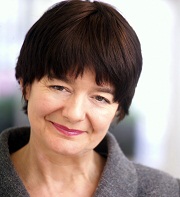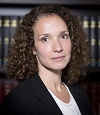James Ewins QC – Queen Elizabeth Buildings (QEB) Chambers, London
 I met James Ewins QC in his chambers at Queen Elizabeth Buildings (QEB). James was one of the 107 new Queen’s Counsel appointed silk in the ceremony in Westminster Hall, London on 22nd February this year. Our conversation ranged widely. We talked about James’s career choices, his life outside of work, about equality and diversity issues and about his experience of the QC selection process.
I met James Ewins QC in his chambers at Queen Elizabeth Buildings (QEB). James was one of the 107 new Queen’s Counsel appointed silk in the ceremony in Westminster Hall, London on 22nd February this year. Our conversation ranged widely. We talked about James’s career choices, his life outside of work, about equality and diversity issues and about his experience of the QC selection process.
Called to the Bar some 19 years ago, James practises exclusively in family law, specialising in complex matrimonial finance issues, including pre-nuptial contracts. He has acted in a wide range of domestic and international cases at all levels from low incomes to multi-million-pound assets. James is also experienced in international forum shopping and enforcement issues, and has appeared as an expert witness in the United States.
James’ path to a career in law was unusual to say the least. He was involved in a car crash when he was ten years old and soon became fascinated by the whole legal process, particularly the conferences with barristers about the settlement of the claim for his injuries. James said that he decided “there and then” that he wanted to become a barrister and set his sights academically towards achieving the A levels that would take him via university and Bar School into the profession. A chance meeting through a friend of a friend put James in touch with the then Head of Chambers at QEB, which led to James doing a mini-pupillage there and then applying successfully for a pupillage at QEB.
James’ passion for the work is evident. ‘Big money divorces’ always have multiple and complex inter-linking facets, he said, such as intricate corporate and family asset structures, internationally held assets, tax angles, inherited wealth or bankruptcy related issues. James has to gain an understanding of those issues in “microscopic detail” with the common thread of the “human, family, element” running through the cases. James said that you get to know a huge amount about people through a forensic examination of their finances, “perhaps more than they know about themselves!” James likens such big money divorces to giant corporate demergers. It is his overarching role to find legal order out of the chaos, introducing objectivity where there are heightened emotions. It is not hard to imagine James as a calming presence in such a legal and human maelstrom, with his easy-going manner.
Of the five competencies on which the Panel seek evidence of excellence, perhaps the most challenging is Diversity, suggested James. In a practice such as his own, his clients and their solicitors are predominantly white British. But that does not mean that it is not possible to be engaged with and proactive on diversity issues. Indeed, James is passionate on the subject and has for many years been active in giving talks to pupils in state schools who might not otherwise give a thought to the legal profession as a possible future career. We also talked later about his passion for anti-slavery issues and activism, which long predated any thoughts of his about applying for silk.
Discussion turned to the application process. James felt that anyone contemplating making an application for QC should not underestimate how time-consuming and demanding it can be. He spent at least a week on the application form. The process also required a rigorous self-examination which “we barristers are not used to”. Barristers, he agreed, are also not used to advocating for themselves. The whole application process was lengthy, could be wearing on the nerves, and had definitely challenged his self-confidence, he said.
James’ decision to apply for silk came against a backdrop of serious ill-health beginning in 2003 when he was diagnosed with cancer. This necessitated taking a year out of work. James suffered a recurrence of the cancer in 2005 and this time continued to work for six months whilst receiving treatment and then took a further six months off work. Throughout his ill-health James had had a lot of time to think about his life, and he decided that he would bring forward a plan he had in mind (probably for post-retirement) to spend two years working pro bono in the third world. QEB chambers generously granted James a two-year sabbatical in 2009 and 2010 and he worked on anti-slavery initiatives in India.
In 2011, James had a third bout of cancer and took some more time out of work. With health once again restored, and as indefatigable as ever, James began work first with the Centre for Social Justice and then with the Home Office on the Modern Slavery Act. He is one of the UK’s leading legal experts on modern slavery and he has combined this knowledge with his professional skills on a number of projects, most of which he has carried out pro bono. These include research work for the Centre for Social Justice, acting as Specialist Legal Advisor to the Home Office Select Committee and advising on the Independent Review of Overseas Domestic Worker Visas. He has also advised on anti-slavery legislation in the UK and across the world.
Serious ill-health has given James a new perspective on work, life, family and putting his beliefs and passions into action, so there has been a rebalancing of priorities. These days, James spends two months a year working pro bono specifically on modern slavery issues and spends a good deal of time with his family. He feels fortunate that his success in his legal speciality enables him to do so. The time he has taken off work, he said, had also given him a new insight into some of the difficulties faced by female colleagues returning to chambers after spells of maternity leave. James recognised that returning to work after maternity leave could be “very tough indeed” for women. His experience returning after serious ill-health was, he thought, probably the inverse of the experience of female barristers returning after maternity leave, in that whereas he “attracted great sympathy and even admiration”, many women struggle to regain their self-confidence while juggling new family responsibilities.
Broadening out the conversation on equality and diversity issues, James said that it was incumbent upon the Bar not only to recognise those disadvantaged through some characteristic such as gender, ethnicity or social class but to remedy that disadvantage. Becoming a barrister was a very expensive process, and James felt strongly that the Bar should put more money into assisted places and scholarships – and ensure that it goes to those who really need the financial assistance. James said that he received a scholarship while at Bar School, but now wondered if it might better have gone to a poorer student. If the Bar and Judiciary was properly to reflect the diversity of modern Britain, more needed to be done, he said. If that meant the present generation of successful barristers subsidising talented disadvantaged students now wishing to go into law, then so be it.
When his Head of Chambers mentioned that possibility of his applying for QC a few years ago, this was in the wake of the cancer at the time he thought, “I do not know if I will last that long.” so he “tended to push the possibility off into the future”. I pointed out to James that, if one subtracted the time he has taken out (due to the sabbatical and ill-health) it amounted to some five years, so to be made silk at age 43 was even more noteworthy. When he came to apply for silk he decided to be “very open” about it, rather than trying to keep it a secret from colleagues, but that did rather “up the ante” if he were to be eventually unsuccessful. But he said that it was not really possible to keep a silk application secret in any event. And when the email arrived saying that he had been recommended for Queen’s Counsel, James said that all the stress of the previous 10 months’ application period suddenly disappeared. The main delight for him in being made silk, apart from the rare professional recognition as a barrister, is the pleasure it has given to his family and friends.
© Queen’s Counsel Appointments Ltd
- Date: March 25, 2019
- Category: QCA Profiles 2016


